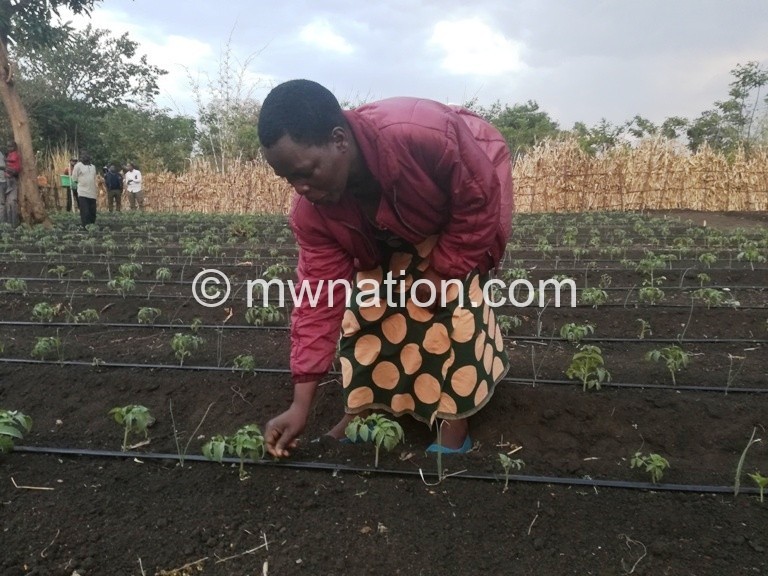Utilising digital extension services
The Covid-19 pandemic has affected all sectors of society in the country, including agricultural extension services whose nature of work requires face-to-face training and field day demonstrations.
Civil Society Agriculture Network national director Pamela Kuwali says both farmers and extension workers are restricted to interact freely and in turn, this has diminished farmers’ access to extension services.

“This calls for embracing of alternative ways of transferring the improved agricultural technologies to the smallholder farmers,” she says.
Luckily, the pandemic has indeed presented an opportunity to be creative and think of alternative ways of reaching out to farmers.
Most organisations turned to digital platforms when they failed to meet the farmers physically.
Plan International Malawi development facilitator Blessings Nyirenda created a WhatsApp group for 113 farmers in Mzimba to enable an exchange of knowledge and information among smallholder farmers and extension staff.
Through the group, the farmers share pictures and videos of various themes they learnt at farmer field schools. The farmers also ask questions on issues that they do not understand.
Mica Chavula, agriculture extension development officer for Chikangawa Extension Planning Area (EPA) in Mzimba South, says the WhatsApp group is making his work easy.

“I am able to reach many farmers easily and to respond to any issues that they may have related to their farming. Farmers also share videos with their fellow farmers on various farming technologies,” he says.
But can digital agriculture extension services work?
Commercial Agriculture Support Services coordinator Charles Govati says digital agriculture extension services can work in Malawi only if the country invests in the necessary information and communication technology (ICT) infrastructure, including rural electrification.
He says mindset change is also necessary to fast-track adoption and acceptance of digital channels as authentic sources for agriculture advisory messages.
Govati says: “There is also need to activate the mindsets on how to screen fake and misleading messages by increasing smallholder farmers’ ability to identify aunthentic sources of digital information.”
Department of Agricultural Extension Services director Jerome Chim’gonda Nkhoma says his department is using e-extension to reach farmers.
The department is working with the Food and Agriculture Organisation (FAO), Farm Radio Trust and other development partners in disseminating agricultural advisories through radio.
Apart from using the radio, the department is also using mobile-based platforms to reach almost 40 000 farmers with information on production, market, nutrition and Covid-19.
Says Chim’gonda Nkhoma: “We are also using Mlimi hotline which is a call centre hosted by Farm Radio. It enables agriculture extension workers to interact with farmers in real-time.
“Our goal is to ensure there is continuity in the production and marketing of the various agriculture commodities.”
He says the department aims at protecting farmers from any type of loss in agriculture production through mainstreaming Covid-19 messages on all the digital platforms.
Challenges
Malawi is still faced with challenges of access and usage of ICT digital tools such as smartphones which would enable the farmers to have access to digital applications.
The 2015 National Statistical Office ICT access survey report showed that only 36 percent have access to a mobile phone and the proportion of those in rural areas is at 30.2 percent.
Apart from access, poor Internet connectivity and the cost of Internet are some of the problems that affect usage of digital platforms.
Blantyre-based Midule Farmers Organisation founder George Goliati concurs with Govati, saying that, to address these challenges, there is indeed need to invest in ICT infrastructure in the country.
“Capacity building of the end-users also becomes critical as the digital tools require a skill,” he says.
After undergoing training in India, Goliati has developed a model that will enable farmers to communicate with their extension worker, have access to market information and video-based extension content on platforms like Access Agriculture.
Way forward
In view of the challenges faced, Kuwali says there is a need to review the current agriculture extension strategy to analyse the gaps and explore ways of addressing them.
On his part, Chim’gonda Nkhoma says digital extension is possible and his department is already doing it.
However, he says what needs to happen is to strengthen coordination among stakeholders in agriculture extension so that only messages that are evidence-based and accurate are sent.
“We have the National Agriculture Content Development Committee that is mandated to develop and review agriculture messages before they are disseminated to the farmers,” says Chim’gonda Nkhoma
Recently, government also reviewed the 2013 Malawi ICT Policy which aims at, among other things, addressing the ICT gaps such as access and connection to ICT services.
As such, there is hope that digital extension services could be utilised to the fullest potential if the government also improves access to the Internet, subsidise the cost of tools and address the issue of low literacy among rural communities.





